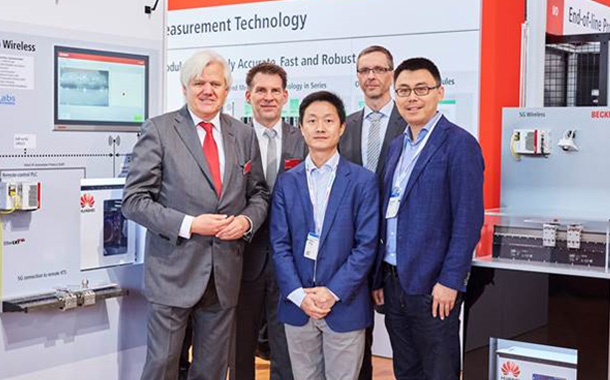Huawei and Beckhoff Automation GmbH demonstrated a key 5G technology for enabling the factory of tomorrow: the wireless Programmable Logic Controller (PLC). During the successful proof-of-concept trial at Hannover Messe, the two companies showed communications between two cooperating PLCs using a 5G-orientated wireless industrial network prototype rather than using legacy cable. Due to the direct integration of cellular technology into the industrial PLCs, industrial automation will be realized in a more economically and environmentally sustainable manner compared to today’s wired line.
“Currently, wireless PLCs tend to connect using low-power, short-range technology, such as ZigBee. Using 5G instead will come with many advantages, such as increased range for remote control with higher performing connectivity and URLLC. Latency as low as 1 ms will improve operators’ reaction time to events and enable safer automation of operations and instant diagnosis of faults,” said Pierce Owen, Principal Analyst, ABI Research.
Over the past several decades, manufacturers have changed the way they do business through lean manufacturing, digitalization, and now, the Industrial IoT (IIoT). However, throughout this they have generally faced the same challenges of maximizing productivity and efficiency, adapting to customer orders and demands, and minimizing downtime. The need to minimize costs while keeping safety a paramount importance, is opening the way for new technologies that allow machines to communicate with each other and with factory-floor workers efficiently through wireless technology.
”The successful PoC in the Hannover Messe is a milestone for the joint innovation project between Beckhoff and Huawei, and verifies the cellular based real-time control for smart manufacturing,” according to Peter Zhou, Chief Marketing Officer of Huawei’s Wireless Solution.
“Beckhoff evaluates advanced communication technologies for use in industrial automation. According to the joint test in the Beckhoff Lab, the 5G live demonstration highlighted some of the key capabilities offered by the new technology; achieving latency as low as 1ms with 500ns clock synchronization,” said Dr. Guido Beckmann, Senior Management Control System Architect, Beckhoff.
Ethernet communication on layer 2, using the EtherCAT Automation Protocol between two standard PLCs, allows remote control of a motion system, one of the high-performance applications in automation.
Beckhoff expects new applications with wireless communication through the targets set by the 5G community: examples include the horizontal coupling of machines in a factory or the vertical connection of machines to a global cloud. Monitoring a machine by attaching (additional) sensors can also be done wirelessly, for example, for condition monitoring and predictive maintenance with the help of low latencies. The first results of the cooperation with Huawei X Labs confirm these assumptions.


